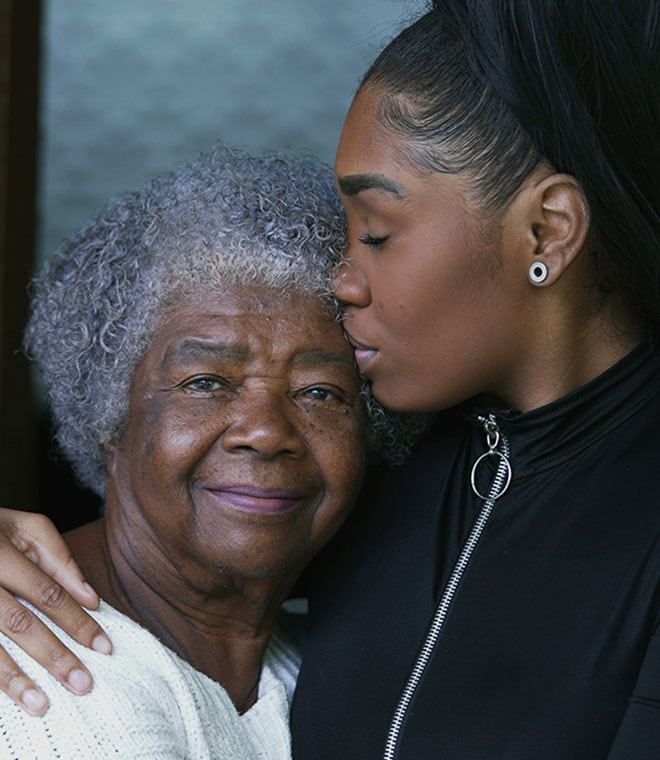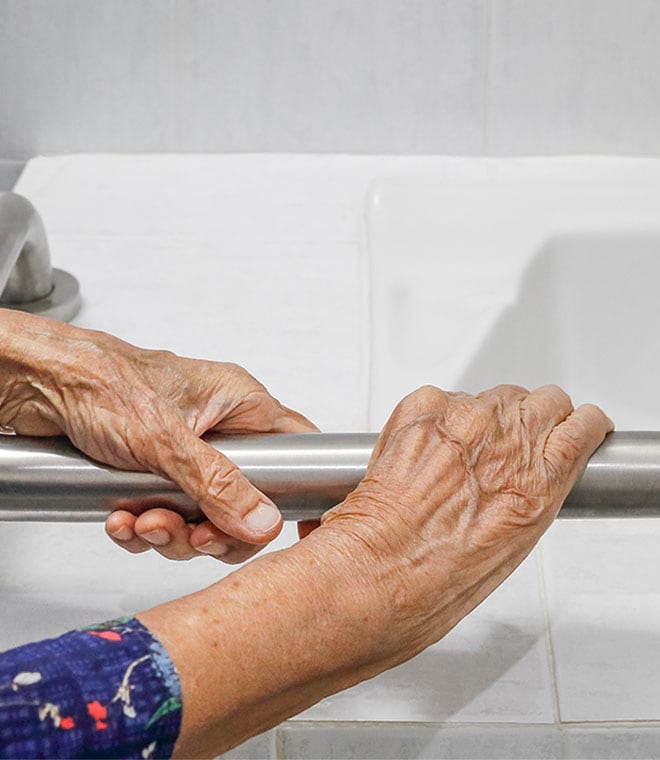Wellness
Nutrition and healthy aging: What caregivers need to know
By Julie Davis Canter Aug 24, 2022 • 6 min
Nutrition needs change as we age, and nutrient shortfalls can happen even when someone looks healthy. As a caregiver, you want to shop and cook with an eye toward providing adequate nutrients without unwanted calories, while meeting any special health concerns. Dehydration and malnutrition need to be on your radar, too. That’s a lot to juggle! These tips will help make it easier.
How nutrition affects aging
A high-quality diet goes a long way toward helping to prevent or manage chronic conditions that happen later in life. Quality counts because people often need fewer calories as they age, yet have similar or even increased nutrient needs than in their younger years.
To make smarter healthy food choices:
- Build meals around nutrient-dense foods from the vegetable, fruit, whole grains, low-fat/nonfat dairy and lean protein groups. For exact portions, check out the MyPlate Plan.
- Include fruits and vegetables in a rainbow of colors for the widest variety of nutrients.
- Choose unsaturated fats, like olive oil. Limit foods high in saturated fats, like butter, cream and fatty meats.
- Use herbs and spices rather than salt for flavor.
If your loved one has lost interest in eating, engage them when you shop and cook. Visit local farmer’s markets for fresh foods. Make meals social events—include family or friends when possible. If chewing and swallowing are difficult, experiment with softer foods and different textures, and make sure any dental or medical conditions get addressed.
Special nutrient considerations for older adults
Protein. Older adults, especially after the age of 71, often don’t eat enough protein, and this can contribute to a loss in muscle mass, strength, and eventually mobility and independence. Good sources: seafood, dairy, legumes (beans, peas and lentils) and soy.
Vitamin B12. Some older adults have trouble absorbing vitamin B12, naturally found in food. Certain medications, like metformin and gastric acid inhibitors, may affect the absorption of vitamin B12 and contribute to a shortage. Good sources: seafood, meat, poultry, milk and foods fortified with vitamin B12, such as some breakfast cereals.
Vitamin B6. Older adults have higher vitamin B6 needs than they did in their younger years. To meet these needs, include these good sources of B6: chickpeas, chicken, salmon, tuna, bananas, potatoes and dark leafy greens.
Fiber. It may be in short supply if your loved one is eating too many refined foods. Good sources: fruits and vegetables with the skins, whole grains, legumes and nuts. (Increase intake slowly to avoid gas and cramps from too much too fast.)
Calcium. Important for bone health, calcium also supports muscle and nerve function. Good sources: dairy, dark leafy greens and fortified foods.
Vitamin D. It works hand in glove with calcium and is involved in many body functions, like managing blood pressure. The body can synthesize vitamin D when bare skin is exposed to the sun, although the amount made often decreases with age. Good sources: fortified milk and plant milks, juices and many breakfast cereals.
Potassium. This mineral helps with fluid balance and heart, muscle and nervous system function. Reducing salty foods while increasing potassium-rich ones may lower the risk of high blood pressure. Good sources: fruits, vegetables and beans.
When is a nutritional supplement needed?
Many people take a specific daily combination formula, like multivitamins for men over 50 or women over 50. But it’s always a good idea to check with your loved one’s healthcare provider first.
Don't forget fluids
Older adults often experience a natural loss in thirst and may not take in enough fluids to stay properly hydrated. Encourage your loved one to sip water throughout the day and with meals. This can help prevent dehydration and aid digestion. Low-fat or nonfat milk and fortified plant milks help satisfy liquid and nutrient needs.
If you want more personalized recommendations to optimize their health, reach out to their primary care provider, a registered dietitian nutritionist (RDN) or, if appropriate, a certified diabetes care and education specialist (CDCES) to identify and address specific nutritional needs.
Published August 2022.
Sources:
- https://health.gov/news/202107/nutrition-we-age-healthy-eating-dietary-guidelines
- https://www.myplate.gov/life-stages/older-adults
- https://acl.gov/sites/default/files/nutrition/Caregiver-Nutrition-Education-Toolkit-FInal_508.pdf
- https://www.nia.nih.gov/health/healthy-meal-planning-tips-older-adults
- https://acl.gov/sites/default/files/nutrition/Nutrition-Needs_Vitamin-B6_FINAL-2.18_508.pdf
- https://www.hsph.harvard.edu/nutritionsource/vitamin-b6/
- https://ods.od.nih.gov/factsheets/VitaminB6-Consumer/
- https://www.fda.gov/media/135599/download
- https://health.clevelandclinic.org/calcium-rich-foods/
- https://www.dietaryguidelines.gov/resources/2020-2025-dietary-guidelines-online-materials/food-sources-select-nutrients/food-sources
- https://ods.od.nih.gov/factsheets/VitaminD-Consumer/



